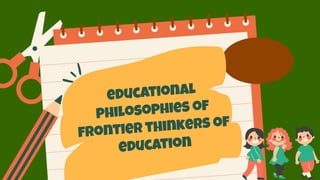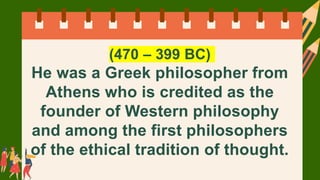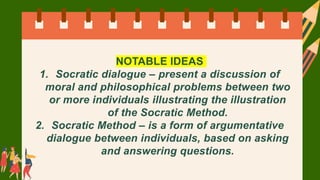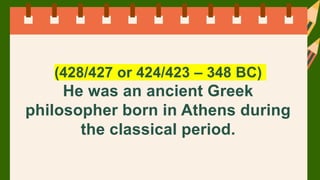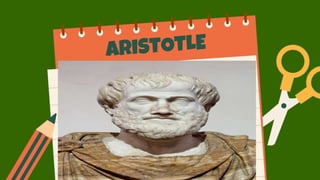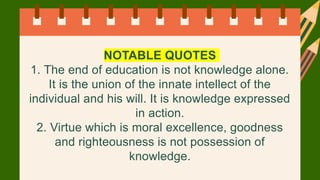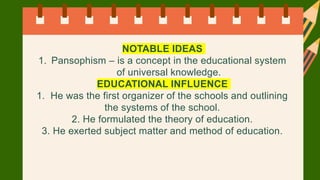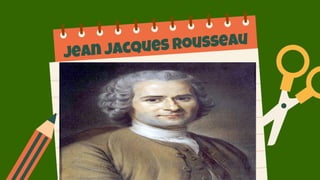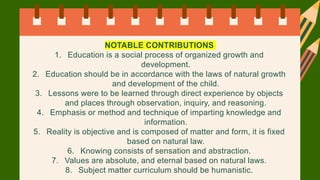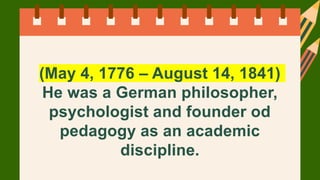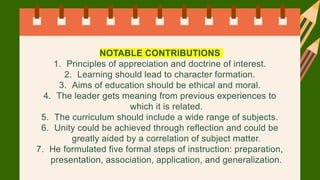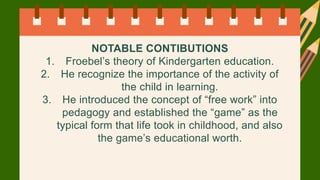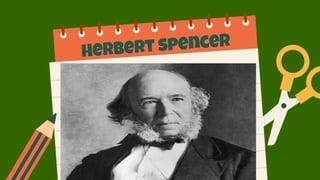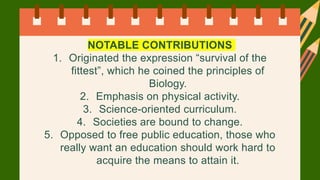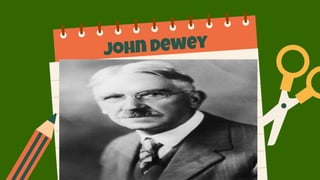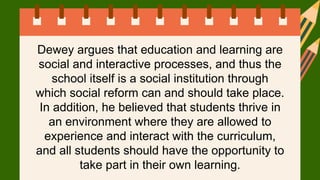EDUCATIONAL PHILOSOPHIES OF FRONTIER THINKERS.pptx
- 3. (470 – 399 BC) He was a Greek philosopher from Athens who is credited as the founder of Western philosophy and among the first philosophers of the ethical tradition of thought.
- 4. NOTABLE IDEAS 1. Socratic dialogue – present a discussion of moral and philosophical problems between two or more individuals illustrating the illustration of the Socratic Method. 2. Socratic Method – is a form of argumentative dialogue between individuals, based on asking and answering questions.
- 5. NOTABLE QUOTES 1. Knowledge is wisdom which, in effect, means virtue. 2. The problem of evil is the result of ignorance. 3. Knowledge is virtue and ignorance is vice. 4. Knowledge is the basis of all right actions including the art of living.
- 7. (428/427 or 424/423 – 348 BC) He was an ancient Greek philosopher born in Athens during the classical period.
- 8. NOTABLE IDEAS 1. Allegory of the Cave – compare the effect of education and the lack of it on our nature. 2. Cardinal Virtues – prudence, justice, fortitude and temperance. 3. Platonic idealism or realism – the physical world is not as real as true as “forms”. 4. Theory of soul – the psyche to be the essence of the person. 5. Platonic love – means more than simple friendship. 6. Platonic Solid – regular polyhedron which means faces are congruent.
- 9. NOTABLE QUOTES 1. Every individual should devote his life to what is best fitted for him to do. 2. The important function of education is to determine what every individual is by nature, capable, and fitted of doing things. 3. Poor leadership will lead to wrong decisions.
- 11. (384 – 322 BC) He was an ancient Greek philosopher and polymath. His writings cover a broad range of subjects spanning the natural sciences, philosophy, linguistics, economics, politics, psychology, and the arts.
- 12. NOTABLE IDEAS 1. Aristotlelianism – usually characterized by deductive logic and an analytic inductive method in the study of natural philosophy and metaphysics. 2. Hylomorphism – a philosophical doctrine which conceives every physical entity or being as a compound of matter and immaterial form. 3. Potentiality and Actuality – are a pair of closely connected principles used to analyze motion, causality, ethics, and physiology.
- 13. NOTABLE QUOTES 1. The end of education is not knowledge alone. It is the union of the innate intellect of the individual and his will. It is knowledge expressed in action. 2. Virtue which is moral excellence, goodness and righteousness is not possession of knowledge.
- 15. (March 28, 1592 – November 15, 1670) He was a Moravian philosopher, pedagogue, and theologian who is considered the father of modern education.
- 16. NOTABLE IDEAS 1. Pansophism – is a concept in the educational system of universal knowledge. EDUCATIONAL INFLUENCE 1. He was the first organizer of the schools and outlining the systems of the school. 2. He formulated the theory of education. 3. He exerted subject matter and method of education.
- 17. EDUCATIONAL WRITINGS The educational writings of Comenius comprise more than forty titles. These texts were all based on the same fundamental ideas: 1) learning foreign languages through the vernacular; 2) obtaining ideas through objects rather than words; 3) starting with objects most familiar to the child to introduce him to both the new language and the more remote world of objects; 4) giving the child a comprehensive knowledge of his environment, physical and social, as well as instruction in religious, moral, and classical subjects; 5) making this acquisition of a compendium of knowledge a pleasure rather than a task; and 6) making instruction universal "to all men and from all points of view".
- 18. NOTABLE CONTRIBUTIONS 1. Development of the whole man before he becomes professional. 2. Effective learning is done through the use of the vernacular. 3. Follow the order of the natural law. 4. Train for character development. 5. Both boys and girls should be included in education regardless of their socio-economic status. 6. Advance the use of visual aids in classroom teaching.
- 20. (August 29, 1632 – October 28, 1704) He was an English philosopher and physician, widely regarded as one of the most influential of Enlightenment thinkers and commonly known as the “father of liberalism”.
- 21. NOTABLE IDEAS 1. Price theory – supply (money) and demand (rent) theory. 2. Monetary thoughts – as a “counter” to measure value, and as a “pledge” to lay claim to goods. 3. The human mind – “the self” – as “that conscious thinking thing”.
- 22. NOTABLE CONTRIBUTIONS 1. “Tabula rasa” or “blank slate” theory – A child is born with the blank mind neither good nor bad. 2. Education can help shape the pupil according to the disposition of the teacher. 3. Emphasized formal discipline, moral, and physical education. 4. Methods of instruction should consider habit formation through drill and exercise, memorization, and reasoning.
- 24. (June 28, 1712 – July 2, 1778) He was a Genevan philosopher, writer, and composer. His political philosophy influenced the progress of the Age of Enlightenment throughout Europe, as well as aspects of the French Revolution and the development of modern political, economic, and educational thought.
- 25. EDUCATIONAL INFLUENCES 1. Education and child rearing – to make a reasoning man (developing the pupil’s character and moral sense). He became an early advocate of developmentally appropriate education. He divides childhood into three stages: 1st stage – 12 years old – when children are guided by their emotions and impulses. 2nd stage – from 12 to 16 years old – reason starts to develop. 3rd stage – from the age of 16 onwards – when the child develops into an adult.
- 26. NOTABLE CONTRIBUTIONS 1. Man is by nature good and virtuous. 2. Development of the child according to his inherent endowments. 3. The child is the most important component of the school system. 4. Use of instinctive tendencies as the starting point of any educational pursuit. 5. “Everything is good as it comes from the hand of the author of nature.”
- 28. (January 12, 1746 – February 17, 1827) He was a Swiss pedagogue and educational reformer who exemplified Romanticism in his approach. He founded several educational institutions both in German and French-speaking regions of Switzerland and wrote many works explaining his revolutionary modern principles of education. His motto was “learning by head, hand, and heart.”
- 29. EDUCATIONAL INFLUENCES 1. Education must be broken down to its elements to have a complete understanding of it. 2. His philosophy of education was based on a four-sphere concept of life and the premise that human nature was essentially good.
- 30. NOTABLE CONTRIBUTIONS 1. Education is a social process of organized growth and development. 2. Education should be in accordance with the laws of natural growth and development of the child. 3. Lessons were to be learned through direct experience by objects and places through observation, inquiry, and reasoning. 4. Emphasis or method and technique of imparting knowledge and information. 5. Reality is objective and is composed of matter and form, it is fixed based on natural law. 6. Knowing consists of sensation and abstraction. 7. Values are absolute, and eternal based on natural laws. 8. Subject matter curriculum should be humanistic.
- 32. (May 4, 1776 – August 14, 1841) He was a German philosopher, psychologist and founder od pedagogy as an academic discipline.
- 33. PRINCIPLES OF EDUCATION Herbart's pedagogy emphasized the connection between individual development and the resulting societal contribution. In Platonic tradition, Herbart espoused that only by becoming productive citizens could people fulfill their true purpose: According to Herbart, abilities were not innate but could be instilled, so a thorough education could provide the framework for moral and intellectual development. In order to develop an educational paradigm that would provide an intellectual base that would lead to a consciousness of social responsibility.
- 34. NOTABLE CONTRIBUTIONS 1. Principles of appreciation and doctrine of interest. 2. Learning should lead to character formation. 3. Aims of education should be ethical and moral. 4. The leader gets meaning from previous experiences to which it is related. 5. The curriculum should include a wide range of subjects. 6. Unity could be achieved through reflection and could be greatly aided by a correlation of subject matter. 7. He formulated five formal steps of instruction: preparation, presentation, association, application, and generalization.
- 36. (April 21, 1782 – June 21, 1852) He was German pedagogue, a student of Pestallozi who laid the foundation for modern education based on the recognition that children have unique needs and capabilities. He created the concept of kindergarten and coined the word, which soon entered the English language as well. He also developed the educational toys known as Froebel gifts.
- 37. NOTABLE CONTIBUTIONS 1. Froebel’s theory of Kindergarten education. 2. He recognize the importance of the activity of the child in learning. 3. He introduced the concept of “free work” into pedagogy and established the “game” as the typical form that life took in childhood, and also the game’s educational worth.
- 39. (April 27, 1820 – December 8, 1903) He was an English polymath active as a philosophe, psychologist, biologists, sociologist, and anthropologists.
- 40. NOTABLE CONTRIBUTIONS 1. Originated the expression “survival of the fittest”, which he coined the principles of Biology. 2. Emphasis on physical activity. 3. Science-oriented curriculum. 4. Societies are bound to change. 5. Opposed to free public education, those who really want an education should work hard to acquire the means to attain it.
- 42. (January 11, 1842 – August 26, 1910) He was an American philosopher, psychologist, and the first educator to offer a psychology course in the United States.
- 43. NOTABLE CONTRIBUTIONS 1. “Father of Psychology”. 2. The value of any truth is utterly dependent upon its use to the person who held it. 3. One should use whatever parts of theories make the most sense and can be proven.
- 45. (October 20, 1859 – June 1, 1952) He was an American philosopher, psychologist, and educational reformer. He was one of the most prominent American scholars in the first half of the twentieth century.
- 46. Dewey argues that education and learning are social and interactive processes, and thus the school itself is a social institution through which social reform can and should take place. In addition, he believed that students thrive in an environment where they are allowed to experience and interact with the curriculum, and all students should have the opportunity to take part in their own learning.
- 47. NOTABLE CONTRIBUTIONS 1. “Learning by doing” (Experiential Learning). 2. Education is life and preparation for life. 3. Education is a crucial process. 4. He argues that for education to be most effective, content must be presented in a way that allows the student to relate the information prior to experiences, thus deepening the connection with this new knowledge. 5. He believed that successful classroom teacher possesses a passion for knowledge and intellectual curiosity in the materials and methods they teach.
Editor's Notes
- main
